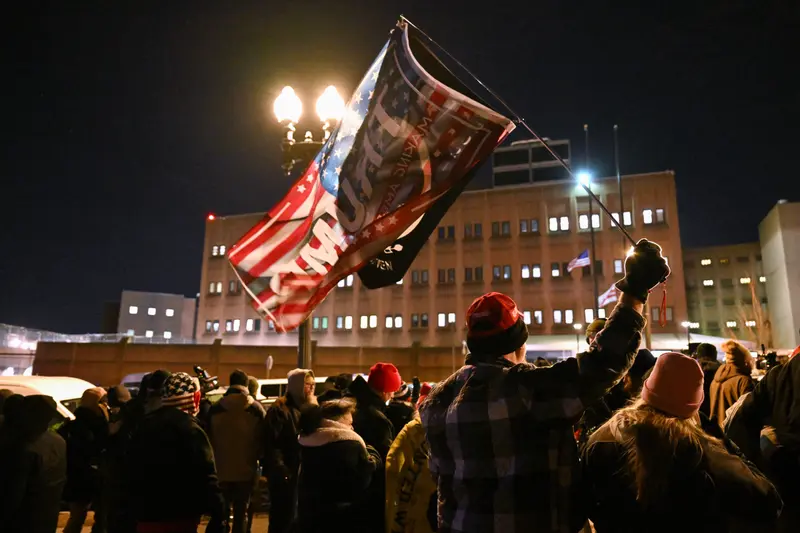The day after President Donald Trump’s inauguration, a surprise visitor joined the crowd outside the D.C. Jail, drawing double takes as people recognized his signature eyepatch: Stewart Rhodes, founder of the far-right Oath Keepers movement.
By the cold math of the justice system, Rhodes was not supposed to be there. He’d gone to sleep the night before in a Maryland prison cell, where he was serving 18 years as a convicted ringleader of the attack on the U.S. Capitol on Jan. 6, 2021. The Yale-educated firebrand who once boasted a nationwide paramilitary network had seen his organization collapse under prosecution.
For the Justice Department, Rhodes’ seditious conspiracy conviction was bigger than crushing the Oath Keepers — it was a hard-won victory in the government’s efforts to reorient a creaky bureaucracy toward a rapidly evolving homegrown threat. On his first day in office, Trump erased that work by granting clemency to more than 1,500 Jan. 6 defendants, declaring an end to “a grave national injustice.”
Rhodes, sporting a Trump 2020 cap, was back in Washington with fellow “J6ers” within hours of his release in the early hours of Jan. 21, 2025 . In the frigid air outside “the gulag,” as the D.C. Jail is known in this crowd, he was swarmed by TV cameras and supporters offering congratulations. Nearby, far-right Proud Boys members puffed cigars. A speaker blared Bob Marley’s “Redemption Song.”
“It’s surreal,” Rhodes said, absorbing the scene.
Credit:
Kent Nishimura/Getty Images
The shock of the moment has continued to reverberate far beyond the jailhouse parking lot.
Trump’s pardons immediately upended the biggest single prosecution in U.S. history and signaled a broader reversal that threatens to create a more permissive climate in which extremists could regroup, weaken the FBI’s independence and revive old debates about who counts as a terrorist, according to current and former federal law enforcement officials and national security experts.
In the whirlwind of the last three weeks, the Trump administration has purged federal law enforcement agencies of prosecutors and investigators who’d been pursuing homegrown far-right groups that the FBI lists as among the most dangerous threats to national security. The Biden administration’s 2021 domestic terrorism strategy — the nation’s first — was removed from the White House website. And some government-funded extremism-prevention programs were ordered to stop work.
“There’s no indication that he engaged in any kind of assessment or has even stopped to think, ‘What did I just unleash on America?’” Mary McCord, a former federal prosecutor who oversaw domestic terrorism cases as a senior Justice Department official, said of Trump’s actions.
Colin Clarke, an analyst at the nonpartisan security-focused Soufan Center, said “far right” and “domestic terrorism” are now “kind of dirty words with the current administration.”
Far-right movements that openly promote violence have suddenly been invigorated, he said. “Does this become a four-year period where these groups can really use the time to strengthen their organization, their command and control, stockpile weapons?” he said.

The shock of the moment has continued to reverberate far beyond the jailhouse parking lot.
Trump’s pardons immediately upended the biggest single prosecution in U.S. history and signaled a broader reversal that threatens to create a more permissive climate in which extremists could regroup, weaken the FBI’s independence and revive old debates about who counts as a terrorist, according to current and former federal law enforcement officials and national security experts.
In the whirlwind of the last three weeks, the Trump administration has purged federal law enforcement agencies of prosecutors and investigators who’d been pursuing homegrown far-right groups that the FBI lists as among the most dangerous threats to national security. The Biden administration’s 2021 domestic terrorism strategy — the nation’s first — was removed from the White House website. And some government-funded extremism-prevention programs were ordered to stop work.
“There’s no indication that he engaged in any kind of assessment or has even stopped to think, ‘What did I just unleash on America?’” Mary McCord, a former federal prosecutor who oversaw domestic terrorism cases as a senior Justice Department official, said of Trump’s actions.
Colin Clarke, an analyst at the nonpartisan security-focused Soufan Center, said “far right” and “domestic terrorism” are now “kind of dirty words with the current administration.”
Far-right movements that openly promote violence have suddenly been invigorated, he said. “Does this become a four-year period where these groups can really use the time to strengthen their organization, their command and control, stockpile weapons?” he said.





